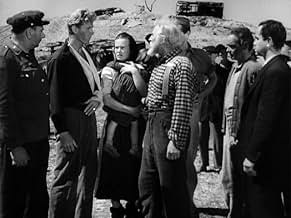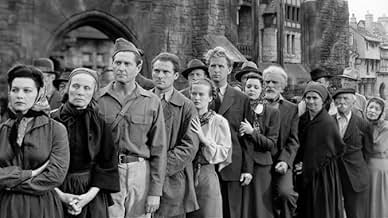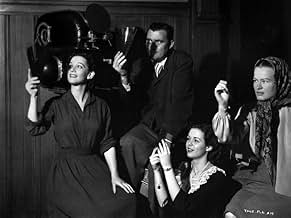CALIFICACIÓN DE IMDb
5.9/10
299
TU CALIFICACIÓN
Agrega una trama en tu idiomaIn the dying days of World War II a German agent infiltrates a recently liberated Belgian town. His aim is to turn them against their Allied liberators.In the dying days of World War II a German agent infiltrates a recently liberated Belgian town. His aim is to turn them against their Allied liberators.In the dying days of World War II a German agent infiltrates a recently liberated Belgian town. His aim is to turn them against their Allied liberators.
- Dirección
- Guionistas
- Elenco
- Premios
- 1 premio ganado en total
Helen Beverley
- Mrs. Martha Varin
- (as Helen Beverly)
Richard Aherne
- Sergeant Patrick O'Farrell
- (as Richard Nugent)
Ludwig Donath
- Schmidt
- (as Louis Donath)
Gigi Perreau
- Baby
- (as Ghislaine Perreau)
Axel Anderson
- Nazi Officer
- (sin créditos)
George Blagoi
- Nazi Officer
- (sin créditos)
Sammy Blum
- Alex
- (sin créditos)
Opiniones destacadas
Interesting and original central plot, more than negated by over-the-top propaganda and preachiness.
1944 and the Allies are pushing the Germans back on all fronts. In a last-ditch attempt to prolong the Third Reich and impose their will upon the world, the Nazis come up with a diabolical plan. Agents are sent to soon-to-be-liberated towns with the intention of blending in with the local population and turning them against the Allied liberators. One such agent is Colonel Frederick Von Beck. His aim is to sow seeds of distrust and revolution among the inhabitants of a small Belgian town.
Very original central plot, giving the movie heaps of potential. However, unfortunately, the year of release gives away how things develop from there. Being made during WW2 meant this was going to be a propaganda film. This doesn't have to be the death knell for a film - it is possible to make a propaganda film that remains watchable decades after the war has ended.
Unfortunately, this is not an example of such a movie. Incredibly one-dimensional and heavy-handed in its propaganda, there is no subtlety here. The Germans are evil to the nth degree. Even the Russians are portrayed as angels - anything for the war effort. Quite over-the-top in the extremeness of the propaganda.
This isn't the worst of it. A stark black-and-white good vs evil film could still have been entertaining. However, there's really not much action. Instead, we have speeches upon speeches, none of which say anything new or edifying - it's all stuff we already know: the Nazis are bad, fascism is bad, people need to be free, etc. Yet, every chance is grabbed to jam in a speech. What should have been one line in a dialogue turns into a several-minute monologue.
It's all so tedious and preachy.
Very original central plot, giving the movie heaps of potential. However, unfortunately, the year of release gives away how things develop from there. Being made during WW2 meant this was going to be a propaganda film. This doesn't have to be the death knell for a film - it is possible to make a propaganda film that remains watchable decades after the war has ended.
Unfortunately, this is not an example of such a movie. Incredibly one-dimensional and heavy-handed in its propaganda, there is no subtlety here. The Germans are evil to the nth degree. Even the Russians are portrayed as angels - anything for the war effort. Quite over-the-top in the extremeness of the propaganda.
This isn't the worst of it. A stark black-and-white good vs evil film could still have been entertaining. However, there's really not much action. Instead, we have speeches upon speeches, none of which say anything new or edifying - it's all stuff we already know: the Nazis are bad, fascism is bad, people need to be free, etc. Yet, every chance is grabbed to jam in a speech. What should have been one line in a dialogue turns into a several-minute monologue.
It's all so tedious and preachy.
Herbert Biberman (1900-1971) is the writer and director of this 1944 film. Biberman was a member of the left wing theatre group in New York City and was married to Gale Sondergaard. Both Biberman and Sondergaard were victims of the HUAC "red scare" – Biberman served time in prison and both were blacklisted.
This was his third film as director, fifth as a writer.
Lloyd Bridges (1913-1998) has a minor role in the film. Bridges too was briefly blacklisted but turned around and would be a staunch right wing presence.
(Doc) Robert Golden produced the film. He also produced "Hitler's Children" (1943) which was directed by Edward Dmytryk, another director imprisoned during the HUAC trials. "Hitler's Children" was the most successful film for RKO, even surpassing King Kong, and led to this film being made.
From the film there aren't many obvious communist themes, but there is a sympathetic Russian soldier and there is a lot of emphasis on people working together. The film is ardently anti-Nazi.
George Coulouris (1903-1989) gives the best performance of his career. Osa Massen (1914-2006) is excellent.
This was his third film as director, fifth as a writer.
Lloyd Bridges (1913-1998) has a minor role in the film. Bridges too was briefly blacklisted but turned around and would be a staunch right wing presence.
(Doc) Robert Golden produced the film. He also produced "Hitler's Children" (1943) which was directed by Edward Dmytryk, another director imprisoned during the HUAC trials. "Hitler's Children" was the most successful film for RKO, even surpassing King Kong, and led to this film being made.
From the film there aren't many obvious communist themes, but there is a sympathetic Russian soldier and there is a lot of emphasis on people working together. The film is ardently anti-Nazi.
George Coulouris (1903-1989) gives the best performance of his career. Osa Massen (1914-2006) is excellent.
Director Biberman is remembered today, if at all, for being one of The Hollywood Ten – film people who defied the House Un-American Activities Committee (HUAC) and ended up in prison: consequently, his career numbered very few films – two ‘B’ thrillers made previous to this and two more (albeit higher-profile) titles after it; I myself had watched the best-regarded of the lot, SALT OF THE EARTH (1954), some time ago.
The two films clearly state where his political sympathies lie – given their celebration of collectivism during periods of turmoil (in the case of THE MASTER RACE, it obviously deals with WWII and, specifically, the ferreting of Nazi criminals and local collaborationists in Belgium once the Allies turn up to liberate the country). Unsurprisingly, all of this gives way to a lot of speechifying – though the war elements render the whole more palatable than was the case with SALT OF THE EARTH (which concerned a prolonged strike at a New Mexico mine-field); the narrative, in fact, throws in everything but the kitchen sink (with plenty of twists and turns along the way) – and, while the characters may come across as stereotypes at times, solidly professional production values (the film was made by RKO at its prime) carry it through.
The cast is modest yet effective – principally George Coulouris in one of his best roles as the Nazi Colonel (the film starts off with him disbanding his chain of command when it becomes clear that the Germans were losing the war) who passes himself off as the patriotic brother of a traitor who has been executed (in this respect, it’s the Hollywood equivalent of Britain’s WENT THE DAY WELL? [1942]). The latter’s surviving wife and daughter are having a hard time coping with this fact, being themselves under a cloud of suspicion – and the German is thus able to observe both sides with relative ease (since he obviously now professes to denounce Nazism, while at the same time rousing gullible locals into resisting the Allies’ help by making them out to be just another group of tyrants!). The more prominent among the ranks of the latter are Stanley Ridges as the American Major in command of the country’s reconstruction and Carl Esmond as a rugged but cheerful Russian officer with medical experience.
One other important female character is that played by Osa Massen, a local girl who succumbed to the advances of a German officer – a relationship which has even produced a child – while her fiancé and brother (Lloyd Bridges, himself in love with the niece of the man Coulouris has replaced!) went to war. There’s much conflict and heartache at the core of such sensitive issues – but understanding, forgiveness and hope for the future eventually prevail. Incidentally, we also get a repentant Nazi (now being held in the same concentration camp where the Belgians had been incarcerated not long before) and it is he who brings about Coulouris’ downfall; the latter had already committed murder and also ordered the destruction of the prison, ostensibly as an act of retribution against the Nazis but really to blame the locals for it – thus causing discord between them and the Allies! The film remains interesting today for its uncompromising and intimate look at the ravages of war, made with relatively few concessions to Hollywood conventions – displaying instead courage, conviction and a passion rarely felt in this type of genre offering.
The two films clearly state where his political sympathies lie – given their celebration of collectivism during periods of turmoil (in the case of THE MASTER RACE, it obviously deals with WWII and, specifically, the ferreting of Nazi criminals and local collaborationists in Belgium once the Allies turn up to liberate the country). Unsurprisingly, all of this gives way to a lot of speechifying – though the war elements render the whole more palatable than was the case with SALT OF THE EARTH (which concerned a prolonged strike at a New Mexico mine-field); the narrative, in fact, throws in everything but the kitchen sink (with plenty of twists and turns along the way) – and, while the characters may come across as stereotypes at times, solidly professional production values (the film was made by RKO at its prime) carry it through.
The cast is modest yet effective – principally George Coulouris in one of his best roles as the Nazi Colonel (the film starts off with him disbanding his chain of command when it becomes clear that the Germans were losing the war) who passes himself off as the patriotic brother of a traitor who has been executed (in this respect, it’s the Hollywood equivalent of Britain’s WENT THE DAY WELL? [1942]). The latter’s surviving wife and daughter are having a hard time coping with this fact, being themselves under a cloud of suspicion – and the German is thus able to observe both sides with relative ease (since he obviously now professes to denounce Nazism, while at the same time rousing gullible locals into resisting the Allies’ help by making them out to be just another group of tyrants!). The more prominent among the ranks of the latter are Stanley Ridges as the American Major in command of the country’s reconstruction and Carl Esmond as a rugged but cheerful Russian officer with medical experience.
One other important female character is that played by Osa Massen, a local girl who succumbed to the advances of a German officer – a relationship which has even produced a child – while her fiancé and brother (Lloyd Bridges, himself in love with the niece of the man Coulouris has replaced!) went to war. There’s much conflict and heartache at the core of such sensitive issues – but understanding, forgiveness and hope for the future eventually prevail. Incidentally, we also get a repentant Nazi (now being held in the same concentration camp where the Belgians had been incarcerated not long before) and it is he who brings about Coulouris’ downfall; the latter had already committed murder and also ordered the destruction of the prison, ostensibly as an act of retribution against the Nazis but really to blame the locals for it – thus causing discord between them and the Allies! The film remains interesting today for its uncompromising and intimate look at the ravages of war, made with relatively few concessions to Hollywood conventions – displaying instead courage, conviction and a passion rarely felt in this type of genre offering.
Based on the title and the first few minutes, this looks like it will be a kind of "Boys from Brazil" story about Neo-Nazis out to reclaim the world, but it's actually a rather run-of-the-mill WWII propaganda melodrama of betrayal and loyalty. George Coulouris plays von Beck, a Nazi general who leads a group of "inner circle" Nazis on the eve of Germany's surrender (the movie was released after D-Day but before the actual surrender). Glad to leave the weakened Hitler behind, the group goes underground, intending to get new identities and foment dissent among the liberated peoples of the former Third Reich. In Belgium, Coulouris pretends to be his brother, moves in with his sister-in-law and her daughter (who were seen as collaborators by the villagers), and tries to derail the Allies to return the land to nomality. Paul Guilfoyle (father to the Paul Guilfoyle who currently plays Brass on CSI) is Coulouris' first conquest in his propaganda battle. Lloyd Bridges is a former concentration camp prisoner and Nancy Gates is his girlfriend. The most interesting character is Helena, played by Osa Massen, who was raped by a German soldier and subsequently bore a child (Gigi Perreau in a wordless performance). The two have become semi-outcasts, seen as tainted by Nazi blood. There is some nice use of light and shadow in some scenes but aside from its interesting set-up, nothing very exciting goes on. After the opening, we never see any of the other "inner circle" Nazis and the whole film becomes a story of the villagers struggling to trust each other again. One of the worst lines of dialogue in any WWII movie occurs here when Bridges has to say, at an inspiring moment, "When the Lord made people, he had a great idea!" Massen is the best actor in the picture, even though she is saddled with having to look wide-eyed and sinister for the first half of the film until her secret shame (which we guess early on) finally comes out.
George Coulouris is nazi Colonel von Beck, near the end of WW II. as a high official, he is sent off to hide in Belgium, hopefully to re-ignite the nazi mission again, by turning the liberated town folk against the americans, and each other. it's even more interesting that this was made in 1944, while the war was still going on! co-stars thirty year old Lloyd Bridges, as Frank Bartoc, and Nancy Gates as Nina. Pretty good film! von Beck tries to stir up mistrust, some of the locals seem to go along with him. some religion. talk of hope. rebuilding. allegiance. faith in beliefs and trust. One of only five films directed by Biberman. he was caught up in the House Un-american Activities Committee actions, in the 1940s. he, his wife Gale Sondergaard, and many others were blocked from working in hollywood, as they refused to testify before the committee. This one is pretty good... could have been great, but I think because the war was still going on, a lot of it is "propaganda" acting, to give hope to those back home, and to prove to the audience that we were on the side of right.
¿Sabías que…?
- Trivia"Lux Radio Theater" broadcast a 60 minute radio adaptation of the movie on Januray 15, 1945 with George Coulouris and Helen Beverley reprising their film roles.
- ErroresThe British officer Captain William Forsythe gives a palm down American style salute.
- Citas
Senior Lt. Andrei Krestov: I'm a doctor. or I was. and I can play the mouth fork.
Major Phil Carson: I was afraid of that.
- ConexionesFeatured in Hollywood the Golden Years: The RKO Story: Dark Victory (1987)
Selecciones populares
Inicia sesión para calificar y agrega a la lista de videos para obtener recomendaciones personalizadas
Detalles
- Fecha de lanzamiento
- País de origen
- Idioma
- También se conoce como
- The Master Race
- Locaciones de filmación
- Productora
- Ver más créditos de la compañía en IMDbPro
- Tiempo de ejecución1 hora 35 minutos
- Color
- Relación de aspecto
- 1.37 : 1
Contribuir a esta página
Sugiere una edición o agrega el contenido que falta

Principales brechas de datos
By what name was Semidioses de barro (1944) officially released in India in English?
Responda
































